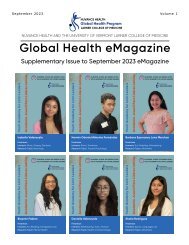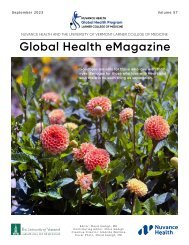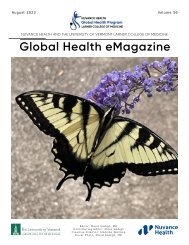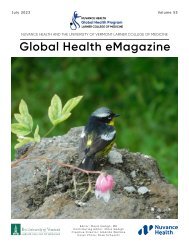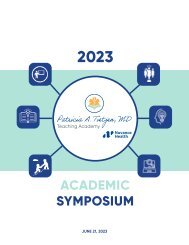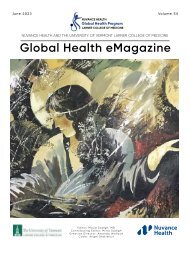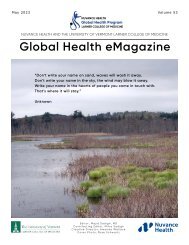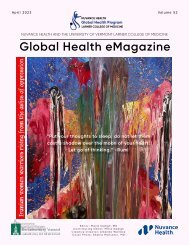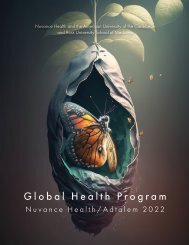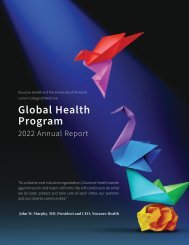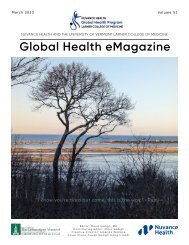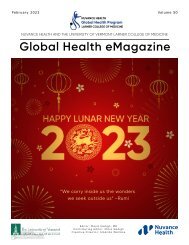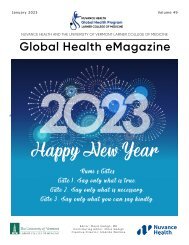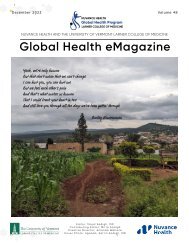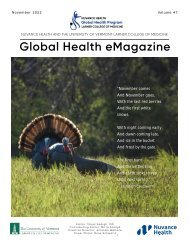September_eMagazine volume 9
You also want an ePaper? Increase the reach of your titles
YUMPU automatically turns print PDFs into web optimized ePapers that Google loves.
<strong>September</strong> 2019 Volume 9<br />
NUVANCE HEALTH<br />
Global Health <strong>eMagazine</strong><br />
What lies behind us<br />
and what lies before us<br />
are tiny matters<br />
compared to what lies within us.<br />
-Ralph Waldo Emerson<br />
Editor; Mitra Sadigh<br />
Creative Director; Amanda Wallace<br />
Cover Photo: Kvon Photography
OUR PEOPLE,<br />
OUR MISSION<br />
Global Health<br />
<strong>eMagazine</strong><br />
<strong>September</strong> 2019<br />
Kilimanjaro<br />
2019 Climb for a Cause<br />
HIGHLIGHTS<br />
The 2019 Climb for a Cause in support of nursing staff interested in global health was successfully<br />
completed on August 3rd.<br />
Read the daily reports here >><br />
Highlights<br />
Reports<br />
Reflections<br />
Healthcare Educators<br />
without Borders<br />
Among the Letters<br />
Perspectives<br />
Article of the Month<br />
Nursing Platform<br />
Announcements<br />
Photo Quiz<br />
Contests<br />
Majid Sadigh and Mitra Sadigh at Uhuru Peak with The Support Group<br />
Clinical Case Report<br />
Photo News<br />
Congratulations<br />
Calendar<br />
Global Health<br />
Participants in the Field<br />
Resources<br />
Katrin Sara Sadigh, Majid Sadigh and Mitra Sadigh in front of Rebmann Glaciers near Uhuru peak, Kilimanjaro’s summit<br />
2
OUR PEOPLE,<br />
OUR MISSION<br />
Global Health<br />
<strong>eMagazine</strong><br />
<strong>September</strong> 2019<br />
Highlights<br />
Toward Establishing a Global Health Program at Home<br />
Jonathan Melk MD<br />
Chief Executive Officer/<br />
Chief Medical Officer<br />
Chiricahua Community Health had the honor<br />
of receiving Drs. Aparna Oltikar and Anamaria<br />
Cristina Mihu from the Western Connecticut<br />
Health Network from August 13-16. We had the<br />
opportunity to share our global health projects<br />
and programs taking place on and near the<br />
rural US/Mexico borderlands of southeastern<br />
Arizona. Both parties are optimistic to form an<br />
impactful and mutually beneficial relationship<br />
in the future.<br />
Reports<br />
Reflections<br />
Healthcare Educators<br />
without Borders<br />
Among the Letters<br />
Perspectives<br />
Article of the Month<br />
Nursing Platform<br />
Announcements<br />
Photo Quiz<br />
Contests<br />
Clinical Case Report<br />
Photo News<br />
Congratulations<br />
Calendar<br />
Global Health<br />
Participants in the Field<br />
Resources<br />
REPORTS<br />
Meeting Summary at the University of Medicine and Pharmacology<br />
Written by the Associate Professor To Mai Xuan Hong<br />
Director of the International Relations Office and Senior Lecturer at the<br />
Department of Obstetrics and Gynecology, University of Medicine and Pharmacy,<br />
Ho Chi Minh City<br />
I am currently the Director of the International<br />
Relations Office at the University of Medicine and<br />
Pharmacy (UMP) in Ho Chi Minh, and also work as<br />
a faculty member in the Department of Obstetrics<br />
and Gynecology in UMP and UMP’s affiliated<br />
maternity hospitals, Hung Vuong Hospital and<br />
University Medical Center - Branch 2. I had the<br />
opportunity to meet Dr. Majid Sadigh on July<br />
16th, 2019 in the UMP International Office and was<br />
interested in what he shared about the Global<br />
Health Program’s philosophy and the purpose of<br />
Linde Healthcare Educators Without Borders: to<br />
educate and train faculty members to become<br />
global doctors who not only work in hospitals or<br />
clinical units, but also apply their enthusiasm to<br />
improving healthcare in communities worldwide. I<br />
was impressed to learn that children in the United<br />
States receive early diagnosis and specialized<br />
care. I hope the Vietnamese healthcare system<br />
enhances its quality in such a way in the near<br />
future.<br />
Dr. Sadigh spent his time visiting and learning more about the daily activities at Children’s Hospital<br />
No. 2 and discussing potential collaborative opportunities towards developing a model for “training<br />
the trainer.” Working in two roles, one as a lecturer in the Faculty of Medicine and the other as a<br />
doctor in Ho Chi Minh’s maternity hospitals, I am faced every day with the struggles of pregnant<br />
women and infants in the outpatient and inpatient departments. My colleagues and I try our best<br />
to help them overcome their health problems in spite of the lack of time for careful consultation<br />
and treatment equipment including medication, nutrition, and hygiene. Though medical students<br />
and future doctors find opportunities to improve their clinical skills in this context, they lack<br />
opportunities to communicate with and express their sympathy to poor patients and their families.<br />
We as healthcare staff distinctly recognize the need for a national program that screens fetal<br />
abnormalities and pregnancy-induced disorders toward preventing these complications as early<br />
as possible.<br />
3<br />
Continued on next page >>
OUR PEOPLE,<br />
OUR MISSION<br />
Global Health<br />
<strong>eMagazine</strong><br />
<strong>September</strong> 2019<br />
However, the most important thing is for healthcare staff to be well-trained and empathetic<br />
toward patients. Though Vietnam has implemented a new program based on primary care that<br />
educates medical students and trains healthcare staff in community health, the training is neither<br />
integrated nor of sufficient quality to impact the nation’s high healthcare demands. Additionally,<br />
we are now living in the “flat world,” and as such, we would love to cooperate with foreign experts<br />
toward conducting detailed and useful activities that help poor patients and healthcare workers<br />
in rural areas. In this context, the Global Health Program and Linde Healthcare Educators Without<br />
Borders have opened a new opportunity for us, Vietnamese doctors and faculty members, to join<br />
hands in working with you toward improving healthcare quality in communities worldwide. We<br />
hope that after attending the intensive training course, Vietnamese doctors will become further<br />
involved in global health and devote their enthusiasm, confidence, and compassion to the wellbeing<br />
of patients.<br />
Highlights<br />
Reports<br />
Reflections<br />
Healthcare Educators<br />
without Borders<br />
Among the Letters<br />
Report on Dr. Majid Sadigh’s Visit of Cho Ray Hospital,<br />
July 17-20, 2019<br />
Written by Dr. Lan Phuong<br />
Dr. Sadigh during a short visit met with the<br />
leadership of the Cho Ray Hospital and the global<br />
health scholars and gave a series of talks about<br />
global health and analytical review of scientific<br />
articles.<br />
Read the report here >><br />
Perspectives<br />
Article of the Month<br />
Nursing Platform<br />
Announcements<br />
Photo Quiz<br />
Contests<br />
August 8: Meeting with the leadership of the Makerere University<br />
School of Public Health<br />
Clinical Case Report<br />
Photo News<br />
Congratulations<br />
Calendar<br />
Global Health<br />
Participants in the Field<br />
Resources<br />
Written by<br />
Susan Byekwaso<br />
Dr. Sadigh had a meeting with Professor Rhoda Wanyeze, Dean<br />
School of Public Health, Prof. Nazarus Mbona Lecturer, Department<br />
of Epidemiology and Biostatistics, Dr. Joan Nakya Mutyaba Lecturer,<br />
Department of Epidemiology and Biostatistics, and Susan Nassaka B<br />
International Coordinator, MakCHS<br />
Read the report here >><br />
Left to Right: Professor<br />
Rhoda Wanyenze, Dr. Majid<br />
Sadigh, Professor Joan Eron<br />
Mutyoba, Professor Nazarius<br />
Tumwesigye, and Ms. Susan<br />
Byekwaso<br />
4
OUR PEOPLE,<br />
OUR MISSION<br />
Global Health<br />
<strong>eMagazine</strong><br />
<strong>September</strong> 2019<br />
6/8/2019: Meeting with the Leadership of<br />
the MakCHS School of Nursing<br />
Written by Susan Byekwaso<br />
Dr. Majid Sadigh visited the MakCHS Department of Nursing<br />
with the objective of forming a collaboration between this<br />
department and the Nursing Division of the UVMLCOM/<br />
WCHN Global Health Program. This educational collaboration<br />
is aimed at improving nursing education toward benefiting<br />
underserved communities. Makerere University Department of<br />
Nursing should be in control and drive the partnership, thereby<br />
serving as a model institution in this collaboration.<br />
Read the report here >><br />
Highlights<br />
Reports<br />
Reflections<br />
Healthcare Educators<br />
without Borders<br />
Among the Letters<br />
Perspectives<br />
Article of the Month<br />
Nursing Platform<br />
Announcements<br />
Photo Quiz<br />
Contests<br />
Dr. Majid Sadigh; Thomas Ngabirano, Associate Head of the Nursing Department; Susan Byekwaso, Coordinator of the<br />
MakCHS International Office; and Lydia Kabiri, International Coordinator of the MakCHS Nursing Department<br />
Clinical Case Report<br />
Photo News<br />
Congratulations<br />
Calendar<br />
Global Health<br />
Participants in the Field<br />
Meeting with the MakCHS<br />
Psychiatry Department,<br />
August 8, 2019<br />
Written by Susan Byekwaso<br />
Read the report here >><br />
Resources<br />
Left to right: Dr. Majid Sadigh; Dr. Akena Dickens,<br />
Director of graduate students; Professor Noeline<br />
Nakasujja, Head of the Psychiatry Department;<br />
Susan Byekwaso, International Coordinator; and<br />
Dr. Joyce Nalugya, a child psychiatrist<br />
5
OUR PEOPLE,<br />
OUR MISSION<br />
My First Week At WCHN<br />
Written by Dr. Simon Otim<br />
a Global Health Scholar and the Program Site Director at St. Francis<br />
Naggalama Hospital, Uganda<br />
Global Health<br />
<strong>eMagazine</strong><br />
<strong>September</strong> 2019<br />
Highlights<br />
Reports<br />
Reflections<br />
Healthcare Educators<br />
without Borders<br />
Among the Letters<br />
Perspectives<br />
Article of the Month<br />
Nursing Platform<br />
Announcements<br />
Photo Quiz<br />
Contests<br />
Clinical Case Report<br />
Photo News<br />
Congratulations<br />
Calendar<br />
Global Health<br />
Participants in the Field<br />
Resources<br />
Dr. Simon Otin (left) with Dr. Joshua Hurwitz<br />
Day 0 (Sunday): I arrived on Sunday 18th of August, 2019 at about 7:00 AM ET at JFK airport.<br />
The security check went smoothly and in thirty minutes I was done. It took me about an hour to<br />
connect with the driver who then drove me to Dr. Sadigh’s home. Along the way, I was treated to<br />
beautiful and unique scenarios of fast cars, wide roads, many road signs and of course the fact<br />
that motorists drive on the right-hand side of the road. As we went through the woods and tall<br />
trees on a slick tarmac, the driver made a gentle turn and said “we are here”. I went to the front<br />
door with my small luggage and rang the doorbell. I was welcomed by Dr. Sadigh himself with a big<br />
strong hug and a lot of excitement and laughter. Finally, I saw a familiar face in this strange land.<br />
After exchanging pleasantries with his wife and another visiting guest from India named Abhinav,<br />
we sat as he made us a big delicious breakfast.<br />
After about a one and a half-hour of rest we took a drive to New Haven where Dr. Sadigh gave<br />
Abhinav and I a guided tour of the Yale University Campus. Notably, we were shown the old<br />
and new campuses; the Yale Sterling Memorial Library, The Women’s Table, The Cathedral of<br />
Knowledge, Yale Beinecke Rare Books and Manuscript Library, Mory’s Club, Yale Law, the Music<br />
schools, Amistad Memorial Site (Make Us Free) in front of New Haven Town Hall and many more<br />
sites. We continued the tour more places in Woodbridge, Watertown, Morris, Litchfield, Bethlehem,<br />
the Shrine of Lourdes in Litchfield, his sister’s home and garden and many more amazing sites. On<br />
our way back at about 4:00 PM, we picked up very delicious Chinese food. We had dinner with Dr.<br />
Sadigh’s family and then I took a shower and went to bed while Dr. Sadigh dropped off Abhinav to<br />
the train station.<br />
Day 1 (Monday): I woke up at 1:00 AM and then stayed awake till morning. After breakfast we set<br />
off at about 5:00 AM to go to Danbury hospital. At the hospital, Dr. Sadigh showed me several<br />
landmarks to help me find my way around including where to find meals.<br />
After dropping my luggage at my assigned room, we met Dr. Joshua Hurwitz at 6:45 AM. A very<br />
wonderful, cheerful, amazing gentleman with a great sense of humor and an amazing teacher.<br />
He took me to his private practice for fertility treatment in Danbury where I met the rest of the<br />
team, who were very wonderful people. The day was packed with very interesting cases and mindblowing<br />
procedures. That afternoon we returned to the Danbury Hospital where we joined a highrisk<br />
obstetric review meeting where cases were presented and reviewed. After this, we joined the<br />
Department of OB/GYN business meeting and I was introduced to the rest of the members by<br />
Chairman Professor Linus Chuang.<br />
6<br />
Continued on next page >>
OUR PEOPLE,<br />
OUR MISSION<br />
Global Health<br />
<strong>eMagazine</strong><br />
<strong>September</strong> 2019<br />
Highlights<br />
Reports<br />
Reflections<br />
Healthcare Educators<br />
without Borders<br />
Day 2 (Tuesday): I linked up with Professor Linus Chuang and joined him in the theatre to observe<br />
the surgeries and I saw how well organized and coordinated the team was together with amazing<br />
machines that are used for the procedures.<br />
Day 3 (Wednesday): I was picked up by Dr. Hurwitz at 6:45 AM and went to his private practice at<br />
Danbury. We went through several cases. Dr. Hurwitz taught me amazing skills and we shared a<br />
bit about our personal lives as well as compared OB/GYN in different parts of the globe handling<br />
different populations with different medical conditions and needs.<br />
Day 4 (Thursday): I was taken to a section of Maternal and Fetal Medicine where I was under<br />
watch by another excellent academician, Dr. Zimmerman (commonly referred to as Dr. Z ) where we<br />
shared about high-risk obstetrics. I saw state of the art equipment used in the management of the<br />
patients. It was amazing. I later caught up with the team at the Global Health office; Lauri Lennon,<br />
Laura Smith and the coordinator of program, Dylan Ochoa who later took me around to Danbury<br />
Fair Mall where I bought a few personal items.<br />
Day 5 (Friday): I was picked up by Dr. Sadigh around 5:45 AM and we drove to Norwalk to meet up<br />
with Dr. Joshua Hurwitz at yet another one of his fertility clinics. Once there, we met and quickly<br />
got down to business. He is a very busy man whose clients and staff love him. He treated me to<br />
a quick tour of the premises and behold...the place looked like a sci-fi lab on another planet.The<br />
team was so welcoming and we quickly learned and started calling each other by first names. We<br />
saw clients, attended procedures, had a wonderful lunch and a baby shower too for one of the<br />
staff members. At 4:00 PM Dr. Sadigh was again sharp on time to pick me up to return to Danbury<br />
Hospital. Overall, it’s been a wonderful first week. I am still trying to wrap my head around all that<br />
I saw in one week and yet, I have only seen one department of the entire hospital. It has been a<br />
beautiful once in a lifetime experience.<br />
Among the Letters<br />
Perspectives<br />
Article of the Month<br />
Nursing Platform<br />
Announcements<br />
Photo Quiz<br />
Contests<br />
Clinical Case Report<br />
Photo News<br />
Congratulations<br />
Calendar<br />
Global Health<br />
Participants in the Field<br />
Resources<br />
7
OUR PEOPLE,<br />
OUR MISSION<br />
REFLECTIONS<br />
Global Health<br />
<strong>eMagazine</strong><br />
<strong>September</strong> 2019<br />
Highlights<br />
Reports<br />
Reflections<br />
Healthcare Educators<br />
without Borders<br />
Among the Letters<br />
Perspectives<br />
Article of the Month<br />
Nursing Platform<br />
Announcements<br />
Photo Quiz<br />
Contests<br />
Clinical Case Report<br />
Photo News<br />
Congratulations<br />
Calendar<br />
Global Health<br />
Participants in the Field<br />
Resources<br />
From Rt to Left; Kaysha Lynne Ribao, Martha and her mother, Ahja Steele, and Fred, ACCESS, Nakaseke, Uganda<br />
Kaysha Lynne Ribao<br />
Global Health Uganda<br />
August – <strong>September</strong> 2019<br />
Martha—one of the many girls who unjustly faces the inequities of poverty and gender, but was<br />
born with fighting power!<br />
My colleague and I were chatting away and getting ready for bed. Fred, a nurse, came knocking<br />
on our door at 9:30pm --- a 25 year old female was in labor. We raced to the theater, the size of<br />
a small bedroom. She was walking naked and barefoot on the beige floors. The exam table with<br />
plastic covering half its size was on a wooden crate. She firmly said, “I want a boy,” as if there was<br />
no other option. She had two daughters with a husband who resides in Kampala, the capital. Was<br />
it the expectation of her husband to have a boy? Or society? I have learned Uganda women are<br />
expected to be soft spoken, gentle in spirit, and most importantly obedient to men. Upon greeting,<br />
a woman respectfully kneels down to any man, elderly, and educated person.<br />
I walked with her and did squats to further descend the baby. After drinking four cups of Ugandan<br />
black tea, she went to the corner of the room where there was a drain to ease herself. She then<br />
continued to walk around the room. Something was wrong. Labor began at eight in the morning<br />
and yet her contractions were inconsistent. Although we broke her water, contractions slowed and<br />
baby wasn’t moving. No fetal heart monitoring or ultrasound was insight. The mom was restless,<br />
sitting on the floor of the theater, crying and begging to go home. I felt helpless! She finally agreed<br />
to Pitocin. As things started to move along, the lights went out for a minute or so (Thank God it<br />
was not longer!). Black outs are a regular occurrence in this part of the world and they are quite<br />
unpredictable.<br />
The mom was pushing and the head was out. Cord was around the neck twice and baby’s face<br />
was blue. The body was not sliding out despite Fred’s efforts to manipulate the head. It was<br />
shoulder dystocia, in which the baby’s shoulder is caught behind the mom’s pubic bone. Mom<br />
had mentioned in passing this baby seemed larger than the others. At that moment, I was filled<br />
with fear. Was death near? At that moment, I realized the gravity and responsibility of being a<br />
8<br />
Continued on next page >>
OUR PEOPLE,<br />
OUR MISSION<br />
Global Health<br />
<strong>eMagazine</strong><br />
<strong>September</strong> 2019<br />
Highlights<br />
Reports<br />
Reflections<br />
Healthcare Educators<br />
without Borders<br />
Among the Letters<br />
Perspectives<br />
Article of the Month<br />
Nursing Platform<br />
Announcements<br />
Photo Quiz<br />
Contests<br />
Clinical Case Report<br />
Photo News<br />
physician. We truly have the power to impact and essentially save a life. Life is precious regardless<br />
of who you are, where you come from, rich or poor. Once it’s taken away, it’s gone forever.<br />
My colleague and I had a mutual understanding that something needed to be done. We decided<br />
to do the McRoberts maneuver with suprapubic pressure while Fred did the Wood’s corkscrew<br />
maneuver. I literally put my full weight onto the mom’s abdomen three times and the baby finally<br />
came out. She was limp, blue, and not crying. As my colleague used the bulb suction, I was rubbing<br />
her vigorously and Fred was tying the umbilical cord. Through it, I prayed. It took at least five<br />
minutes to hear a slight cry. As my colleague revived the baby, I delivered the mom’s placenta by<br />
twirling the umbilical cord around my finger because there was no clamp. There was meconium,<br />
blood, and mom’s feces on the exam table, floor, and even my shoes…. Essentially everywhere. I’ll<br />
never forget the mom’s face when she realized the baby was a girl- disappointment, sadness, and<br />
eventually apathy. I washed the mom with a bucket of water over the same drain that drained all<br />
the other fluids. She then walked into the waiting room without her baby.<br />
I believe women are invaluable. They are the foundations of many families, working and sometimes<br />
sacrificing their dreams to care for their family while some experience domestic abuse, poverty,<br />
venereal diseases, and infidelities of their husbands. I see absolute resilience. Yet, women throughout<br />
the world do not receive the recognition or respect they rightfully deserve. That’s why I believe it is<br />
important for girls and women to be empowered by each other and given opportunities to open<br />
doors. That is why my journey of becoming a woman of color physician is so important. I want to<br />
be an example for women. We are strong, brilliant, important, have a voice, and have a right to<br />
dream. ACCESS (African Community center for Social Sustainability) has been part of this journey<br />
of change through their various programs of Dream Girls, Orphans and other Vulnerable Children,<br />
the Nursing School, and family planning outreach. I am glad to be part of this and hope other<br />
students will continue to participate in ACCESS’ mission. We saw Martha, the baby a week after<br />
her birth and she was healthy and mom was happy, giving her full love and attention to another<br />
strong and beautiful girl.<br />
This experience taught me the significance of teamwork. This baby would not have been delivered<br />
safely if we all did not do our part—my colleague attending to the baby, me to the mom, and Fred<br />
working on both mom and baby. We had a mutual understanding of the situation and agreed<br />
on the plan. There are many hopes I have for the future mothers and babies of Uganda. I hope<br />
mortality rates will decrease by improving prenatal care. Every pregnant woman should be provided<br />
free check ups that includes basic screening tests, education of pregnancy complications, and<br />
how to reduce it. In the United States, once a woman is pregnant, they start their prenatal check<br />
ups a few couple of months and eventually monthly. During their care, women are screened for<br />
infectious diseases and genetic abnormalities, counseled on diet and exercise, and tested for<br />
gestational diabetes and hypertension. If there are any complications, the mom and baby are<br />
monitored closely with non-stress tests, fetal ultrasounds, and at times referred to a specialist. If<br />
a baby is larger, Cesarean section is usually offered. In this case, Martha’s mother did not have<br />
these options—instead the delivery was prolonged and painful. Lastly, I want babies and moms to<br />
have access to life saving equipment such as oxygen, vital signs monitoring, and a warmer. I want<br />
girls such as Martha to grow up into self driven, educated, and leading women who will work in<br />
addressing socioeconomic and gender disparities that exist in Ugandan society.<br />
Congratulations<br />
Calendar<br />
Global Health<br />
Participants in the Field<br />
Resources<br />
9
OUR PEOPLE,<br />
OUR MISSION<br />
HEALTHCARE EDUCATORS<br />
WITHOUT BORDERS<br />
Global Health<br />
<strong>eMagazine</strong><br />
<strong>September</strong> 2019<br />
Highlights<br />
Reports<br />
Reflections<br />
Healthcare Educators<br />
without Borders<br />
Among the Letters<br />
Perspectives<br />
Article of the Month<br />
Nursing Platform<br />
Announcements<br />
Photo Quiz<br />
Contests<br />
Clinical Case Report<br />
Photo News<br />
Congratulations<br />
Calendar<br />
Global Health<br />
Participants in the Field<br />
Resources<br />
Tendai Machingaidze<br />
Associate Site Director of the UVMLCOM/WCHN<br />
Global Health Program in Zimbabwe<br />
A cholera outbreak was declared in Harare by the Ministry of<br />
Health and Child Care (MoHCC) of Zimbabwe on <strong>September</strong><br />
6, 2018. This is not the first, nor will it likely be the last<br />
crisis related to the pathogen Vibrio cholera in Zimbabwe.<br />
Historically, organizations such as the WHO, UNICEF, Global<br />
Outbreak and Response Network (GOARN), Oxfam, Mercy<br />
Corps, Welthungerhilfe (WHH), and Christian Care, to name<br />
but a few, have taken the lead and stepped in to aid in<br />
managing such crises.<br />
It must, however, not be overlooked that over the decades,<br />
Zimbabwean doctors, nurses, and community health<br />
workers have become experts adept at dealing with cholera<br />
outbreaks despite their low-resource settings. Within the<br />
indigenous experience of these Zimbabwean health workers<br />
lies a wealth of knowledge and expertise that is perhaps incomparable and irreplaceable with<br />
regards to dealing with cholera in an underdeveloped setting.<br />
Imagine, then, that there is a cholera outbreak in Uganda. Aren’t these Zimbabwean health workers<br />
uniquely equipped to educate their counterparts in East Africa on how to deal with such a crisis?<br />
Many of the existing structures of global healthcare are built on the framework of the superiority<br />
of developed countries in the “Global North” in relation to underdeveloped communities in the<br />
“Global South.” The essence of colonialism still lingers in much of how the Global North relates with<br />
less privileged nations in terms of international aid. When a crisis arises in healthcare, education,<br />
economics, or politics, it is assumed that the Global North has the best answer. As such, these<br />
countries travel across oceans to solve problems and teach from a position of presumed authority.<br />
The problem, however, with such a model is that it overlooks the monumental role that context plays<br />
in such situations. For example, in Zimbabwe there are the mapostori, a religious sect whose beliefs<br />
forbid its people from seeking medical treatment. A community health worker from Zimbabwe<br />
who has dealt with the challenges of trying to administer treatment among the mapostori during<br />
an epidemic is far better equipped to educate health workers in a similar context in Uganda or<br />
Vietnam on how to handle this situation than an aid worker from the Global North who has never<br />
encountered such cultural and religious customs.<br />
The fault, however, does not lie only with countries in the Global North. The Global South has also<br />
retained a so-called “colonial mentality.” Rather than pooling its own resources to find indigenous<br />
and sustainable solutions to its dilemmas, the Global South far too often waits for handouts from<br />
the Global North. Despite the fact that great strides have been made in healthcare and education<br />
in these countries over the years, the Global South undervalues its experience and expertise, and<br />
hence tragically forfeits its place on the global stage.<br />
Médecins Sans Frontières (MSF) was founded in 1971 in Paris by a group of journalists and doctors<br />
in the wake of war and famine in Biafra, Nigeria. Their aim was to establish an independent<br />
organization aimed at delivering emergency medical aid effectively. Now, they have become a<br />
worldwide movement of more than 45,000 people that provide medical assistance to people<br />
around the globe. Much of the MSF staff is hired locally and regionally, and then teams are<br />
supplemented by field assignments from abroad.<br />
Medicine and education are two sides of the same coin. Both are fundamental human rights, and<br />
the success of one is largely dependent on the success of the other. Indeed if there is a cholera<br />
outbreak in Uganda, the medical personnel and logistical support provided by an organization<br />
such as MSF is crucial. But what of medical education? There are, of course, aid organizations that<br />
10<br />
Continued on next page >>
OUR PEOPLE,<br />
OUR MISSION<br />
Global Health<br />
<strong>eMagazine</strong><br />
<strong>September</strong> 2019<br />
Highlights<br />
Reports<br />
have medical education as part of their mission, but it is not enough. There is a glaring need for<br />
institutions that focus solely on medical education in the sphere of global healthcare.<br />
The Western Connecticut Health Network/University of Vermont Larner College of Medicine (WCHN/<br />
UVMLCOM) Global Health program has developed global health sites in several countries around<br />
the world. Imagine for a moment that colleagues in these seven countries (and counting) formed a<br />
team of medical educators. Each scholar on the team would offer expertise according to his/her<br />
particular context and experiences. From updating a medical school curriculum to responding to<br />
a health crisis, the Global North and Global South would stand together to address the vast array<br />
of medical education needs around the world.<br />
The mammoth task of global health necessitates collaborations between the Global North and<br />
Global South whose foundations are capacity building and sustainability. Unity rather than further<br />
divisions should be the guiding theme if we are to accomplish work in healthcare that is truly<br />
“global.”<br />
It is time for the Global North and Global South to rise up together. It is time for medical educators<br />
around the world to unite and mobilize their knowledge and expertise to solve the health dilemmas<br />
we face together as humans. It is time for the Global North and the Global South to form “A United<br />
Nations of Medical Educators without Borders!”<br />
Reflections<br />
Healthcare Educators<br />
without Borders<br />
AMONG THE LETTERS<br />
Among the Letters<br />
Perspectives<br />
Article of the Month<br />
Nursing Platform<br />
Announcements<br />
Photo Quiz<br />
Contests<br />
Dear Prof. Sadigh,<br />
It seems there is more interest at Botswana University in partnership with the WCHN Global<br />
Health Program.<br />
I have been asked to make a presentation at the Faculty Executive Meeting.<br />
Thank you.<br />
Professor Lynnette Kyokunda<br />
Head, Department of Pathology<br />
Clinical Case Report<br />
Photo News<br />
Congratulations<br />
Calendar<br />
Global Health<br />
Participants in the Field<br />
Resources<br />
11
OUR PEOPLE,<br />
OUR MISSION<br />
Global Health<br />
<strong>eMagazine</strong><br />
<strong>September</strong> 2019<br />
Highlights<br />
PERSPECTIVES<br />
Sexual Harassment and Violence Across Global Contexts<br />
Sexual harassment and other forms of sexual and gender based violence are ubiquitous.<br />
Participants of global health programs often experience and report such abuses while living<br />
and working in low-to-middle-income countries. Efforts should be made to provide guidance<br />
and support so that these individuals can effectively cope with these situations. However, the<br />
framework for understanding sexual harassment and abuse has fundamentally changed with the<br />
#MeToo movement. This widespread grassroots movement has shaken the historic tolerance of<br />
sexual harassment, and has led to both discourse and action of global impact. The global health<br />
community must now educate its members, from trainees to faculty and researchers, on how to<br />
advocate for one’s own rights and the rights of others in the face of sexual harassment and abuse<br />
in the era of the #MeToo movement.<br />
Reports<br />
Reflections<br />
Healthcare Educators<br />
without Borders<br />
Among the Letters<br />
Perspectives<br />
Article of the Month<br />
Nursing Platform<br />
Announcements<br />
Photo Quiz<br />
Contests<br />
Clinical Case Report<br />
Photo News<br />
Congratulations<br />
Calendar<br />
Global Health<br />
Participants in the Field<br />
Resources<br />
Sexual Harassment on the Streets of Uganda<br />
Written by Jamidah Nakato, PhD<br />
Assistant Lecturer at Makerere University<br />
While sexual harassment is described as the bullying<br />
or coercion of a sexual nature and the unwelcome or<br />
inappropriate promise of rewards in exchange for sexual<br />
favors, the coining of this concept is relatively new to many in<br />
Uganda. Sexual harassment includes a range of actions from<br />
mild transgressions such as looks or touch to sexual abuse<br />
or assault. Harassment can occur in many different social<br />
settings such as on the street, and the harassers or victims<br />
may be of either gender. On the streets of Uganda, sexual<br />
harassment largely encompasses transgressions of a milder<br />
form as opposed to sexual abuse. Often times, it is expected<br />
that women, especially young and attractive ones, walking<br />
down the streets of Kampala will hold the attention of men.<br />
It is a common scenario for young and working women, such<br />
as bank employees. However, this is rarely seen as sexual<br />
harassment. Even if it were, it would be difficult to prove to the public and in the court of law.<br />
Meanwhile, some women may appreciate this attention as it may boost their self-confidence by<br />
reasserting the belief that they are attractive, while other women may find it intrusive and even<br />
offensive.<br />
There are also instances in which women are touched while walking on the streets of Kampala,<br />
especially by taxi touts and conductors who compete for clients at slow hours of the day. In these<br />
situations, these men may believe that by touching a woman, they can convince her to get into the<br />
standby taxi as a passenger. Though this is unwanted physical contact, it is not necessarily seen<br />
as sexual harassment. However, on crowded streets, women will get unwanted touches without<br />
any other intention.<br />
In most cultures in Uganda, the term sexual harassment is rarely used because there can be a thin<br />
line between sexual harassment and dating or showing interest in someone. Also, in most of our<br />
cultures, sexual advances are rarely on public display and would be seen as completely improper.<br />
Therefore these instances are rarely confronted on the street. In addition, sexual harassment is a<br />
humiliating situation that is commonly ignored except in cases in which the victim has the courage<br />
and means to report the incident. In fact, what one might view as bullying or hounding, another<br />
might view as persistence, which may be an acceptable trait in a serious partner. After all, the<br />
general understanding is that men know their role to include making advances on women, while<br />
women also expect advances from men.<br />
It is important to note that the harassers are mostly men and rarely women because of the Uganda’s<br />
culture. All in all, sexual harassment is a complicated issue. Its definition may vary from setting to<br />
setting and from person to person. If sexual harassment is to be defined as above, “bullying or<br />
12<br />
Continued on next page >>
OUR PEOPLE,<br />
OUR MISSION<br />
Global Health<br />
<strong>eMagazine</strong><br />
<strong>September</strong> 2019<br />
coercion of a sexual nature and the unwelcome or inappropriate promise of rewards in exchange<br />
for sexual favors,” few instances of sexual harassment exist on the streets of Uganda. However,<br />
when such incidents exist, they are commonly ignored and rarely reported for fear of humiliation<br />
or retribution due to the fact that it is difficult to prove, and Uganda is a predominantly malecentered<br />
society.<br />
The following list describes specific actions one can undertake to avoid or counter sexual<br />
harassment while in Uganda:<br />
• Wear modest clothing and avoid provocative dress (e.g. leggings, miniskirts, short shorts, etc)<br />
while walking on the streets.<br />
• Learn to say a firm and unfriendly “No” to the harasser.<br />
• Avoid oversocialization with strangers. They may consider this attention as interest.<br />
Highlights<br />
Reports<br />
• Be prudent with whom personal contact information is shared. When in doubt, choose not to<br />
share this information.<br />
• Have a buddy who is familiar with the local customs as a resource and guide when confronting<br />
more difficult issues.<br />
Reflections<br />
Healthcare Educators<br />
without Borders<br />
Among the Letters<br />
Perspectives<br />
Article of the Month<br />
Nursing Platform<br />
Announcements<br />
Photo Quiz<br />
Contests<br />
Clinical Case Report<br />
Photo News<br />
Congratulations<br />
Calendar<br />
Global Health<br />
Participants in the Field<br />
Resources<br />
Safety in Global Health<br />
Don’t Be Blinded<br />
Written by Stephen J Scholand, MD<br />
Associate Director of Global Health<br />
It was quite late in the evening, and I was walking alone in a crowded<br />
urban market. It wasn’t the best area of town, but I needed to do<br />
some last minute souvenir shopping for my loved ones at home. I<br />
thought of their interest and enjoyment in receiving some beautiful<br />
and unique handicrafts from local artisans.<br />
Admittedly my focus was elsewhere. I headed towards a pedicab, a<br />
bicycle powered contraption with sidecar, enveloped in a tough vinyl<br />
shell. As I entered, I heard a shrill whistle, which sprung me from my<br />
shopping revere. I was weighed down with a few shopping bags, but<br />
now as I slid into the pedicab, I realized in essence I was ‘trapped’<br />
by a sinewy looking passenger who blocked my only exit. The whistle<br />
was to alert some unknown and unseen accomplices in the crime<br />
that was unfolding. Adrenaline shot through my circulation. “Give me<br />
your wallet” the man said in broken English. I could not go forward, I could not go backwards, I<br />
could not get out. I was trapped! I pretended I didn’t understand what he was saying, so I asked<br />
him to repeat – “what”? It gave me a few milliseconds more to think. ‘What if he pulled a knife’,<br />
‘what if he took my cell phone’, ‘what about all these gifts I just bought for my family and friends’?<br />
The man hissed again, “Give me your wallet” My mind raced, but my body was trapped in the<br />
pedicab ‘how can I escape’, ‘should I fight’, ‘what if he resorts to violence’? Realizing the futility of<br />
the situation, I handed over my wallet. He withdrew all the cash and handed it back to me, before<br />
he slipped out the door. Before I could breathe a sigh of relief, a hand snaked back and snatched<br />
the glasses off my face– effectively blinding me and ensuring his successful escape. I could not run<br />
after him, not that I would want to given my situation.<br />
I was very relieved not to have been a more hapless victim… In fact, I still held onto my priceless<br />
cell phone, and a sack full of souvenirs. Most importantly I was physically unharmed, it might have<br />
been different…<br />
Looking back, I realized I violated several cardinal rules of safety:<br />
1 – never travel alone<br />
2 – be careful going out at night<br />
3 – maintain critical awareness of your surroundings<br />
Attention to these basic principles is important, and our Global Health program takes safety<br />
extremely seriously. Make sure to think about your own safety and review safety protocols prior to<br />
your global health experiences.<br />
13
OUR PEOPLE,<br />
OUR MISSION<br />
ARTICLE OF THE MONTH<br />
Conceptualizing Medical Humanities Programs in Low-Resource Settings<br />
in Africa<br />
Global Health<br />
<strong>eMagazine</strong><br />
<strong>September</strong> 2019<br />
Highlights<br />
Reports<br />
Reflections<br />
Healthcare Educators<br />
without Borders<br />
Among the Letters<br />
Perspectives<br />
Article of the Month<br />
Nursing Platform<br />
Eichbaum, Quentin MD, PhD, MPH, MFA, MMHC; Reid, Steve MBChB, MMed, PhD;<br />
Coly, Ayo PhD; Naidu, Thirusha PhD; Omaswa, Francis MBChB, MMed<br />
Academic Medicine: August 2019 - Volume 94 - Issue 8 - p 1108–1114<br />
The role of the humanities in medical education remains a topic of dynamic debate in medical<br />
schools of high-income countries. However, in most low- and middle-income countries, the medical<br />
humanities are less topical and rarely even have a place in the curriculum. Reasons for this dearth<br />
include inadequate resources to support such programs coupled with misapprehension of the role<br />
and significance of the humanities in medical education.<br />
In this article, the authors argue that the humanities have a vital role to play in the low-resource<br />
settings of African medical education. They discuss the complexities of the continent’s sociohistorical<br />
legacies, in particular the impact of colonization, to provide contexts for conceptualizing humanities<br />
programs in African schools. They outline the challenges to developing and implementing such<br />
programs in the continent’s under-resourced medical schools and present these as four specific<br />
conundrums to be addressed. As a general guide, the authors then suggest four non-prescriptive<br />
content domains that African medical schools might consider in establishing medical humanities<br />
programs.<br />
The goal is to jump-start a crucial and timely discussion that will open the way for the feasible<br />
implementation of contextually congruent humanities programs in the continent’s medical schools,<br />
leading to the enhanced education, training, and professional development of its graduating<br />
physicians.<br />
Read more here >><br />
Announcements<br />
Photo Quiz<br />
Contests<br />
Clinical Case Report<br />
Photo News<br />
Congratulations<br />
Calendar<br />
NURSING PLATFORM<br />
Global Health comes to Nuvance!<br />
In follow up to last month’s e-magazine article, Global<br />
Health is expanding and invites our nurses to become<br />
involved in the many international opportunities to<br />
partner with colleagues around the world.<br />
Global Health<br />
Participants in the Field<br />
Resources<br />
Catherine G. Winkler, PhD, MPH, APRN-BC<br />
We have visitors coming from Dalian, China around<br />
October 15, 2019. Four colleagues, 2 physicians and 2<br />
nurses will spend one month with us learning about our<br />
healthcare delivery system, the processes of care, and<br />
medical and nursing education. We, in turn will have the<br />
opportunity to learn about them and together advance<br />
knowledge which will benefit patient care no matter the<br />
location!<br />
A Grand Rounds is planned for the end of October. Please stay posted for the date, time and<br />
location. There will be opportunities to listen in if attendance isn’t possible. An overview of Global<br />
Health will be presented as well as future initiatives. Our guest speaker will be Dr. Majid Sadigh, The<br />
director of the global health program with added presentations by Jo Richie, Director of Nursing<br />
Professional Practice, and Catherine Winkler, PhD, MPH, APRN-BC, Director of Nursing Division at<br />
Global Health Program – WCHN).<br />
We look forward to seeing you at Grand Rounds and having you join the global team! For additional<br />
information - please contact Catherine G. Winkler at Catherine.winkler@wchn.org.<br />
14
OUR PEOPLE,<br />
OUR MISSION<br />
ANNOUNCEMENTS<br />
WCHN Microbiology Lab in St. Francis Naggalama Hospital is<br />
fully operational (a report will be following soon)<br />
Global Health<br />
<strong>eMagazine</strong><br />
<strong>September</strong> 2019<br />
Highlights<br />
Reports<br />
Reflections<br />
Healthcare Educators<br />
without Borders<br />
Among the Letters<br />
Perspectives<br />
Article of the Month<br />
Nursing Platform<br />
Announcements<br />
Photo Quiz<br />
Left to right: Dr. Anna Vaiman, Dr. Simon Othim, Dr. Dilyara Khastieva, and lab technicians in front of the WCHN<br />
Microbiology lab<br />
Nuvance Health Global Health Information Center<br />
Contests<br />
Clinical Case Report<br />
Photo News<br />
Congratulations<br />
Calendar<br />
Global Health<br />
Participants in the Field<br />
Resources<br />
Joseph Kalanzi, Dr. Majid Sadigh, and Dr. Annet Kutesa, Senior Lecturer at the Department of Dentistry in front of the<br />
Nuvance Global Health Information Center<br />
The Nuvance Health Global Health Information Center will be fully functional by <strong>September</strong> 2019<br />
in Makerere University Main Campus<br />
15<br />
Continued on next page >>
OUR PEOPLE,<br />
OUR MISSION<br />
A New Homestay in Kampala: The Home of Dr. Joseph Kalanzi,<br />
Chief Resident of the MakCHS Emergency Department<br />
Residency Program<br />
Global Health<br />
<strong>eMagazine</strong><br />
<strong>September</strong> 2019<br />
Highlights<br />
Reports<br />
Reflections<br />
Healthcare Educators<br />
without Borders<br />
Among the Letters<br />
Perspectives<br />
Article of the Month<br />
Nursing Platform<br />
Dr. Joseph Kalanzi (the first from Rt.) and Makerere University Emergency Medicine Residents<br />
The apartment is located in Bukoto, a safe and quiet suburb within eight kilometers of the city<br />
center and five kilometers from Mulago Hospital. It is within walking distance of the Kabira Country<br />
Club, Ndere Cultural Center, supermarkets, and entertainment spots, and is accessible by<br />
public transport. The apartment comes with services including meals, laundry, cleaning, airport<br />
pickup, and transport within Kampala.<br />
Announcements<br />
Photo Quiz<br />
Contests<br />
Clinical Case Report<br />
Photo News<br />
Congratulations<br />
Calendar<br />
Global Health<br />
Participants in the Field<br />
Resources<br />
Living Room<br />
The Global Health<br />
Program table<br />
at the student<br />
resource fair at<br />
UVMLCOM<br />
The Global Health Program table at<br />
the student resource fair<br />
Continued on next page >><br />
16
OUR PEOPLE,<br />
OUR MISSION<br />
PHOTO QUIZ<br />
Global Health<br />
<strong>eMagazine</strong><br />
<strong>September</strong> 2019<br />
Editor: Stephen Scholand<br />
A female teacher in South Africa with a chronic non-healing<br />
ulcer on lower left leg (Michael Lee)<br />
Highlights<br />
Answer: Idiopathic Pyoderma Gangrenosum<br />
She was treated with steroids.<br />
Reports<br />
Reflections<br />
Healthcare Educators<br />
without Borders<br />
Among the Letters<br />
Perspectives<br />
Article of the Month<br />
Nursing Platform<br />
Announcements<br />
Photo Quiz<br />
Contests<br />
Clinical Case Report<br />
When you are not protected by long sleeves and deet in<br />
Thailand’s forests<br />
What is the differential diagnosis?<br />
What are the potential consequences?<br />
Stephen Scholand (South Thailand)<br />
Answers:<br />
Mosquito bites<br />
Malaria<br />
Japanese Encephalitis<br />
Elephantiasis<br />
Photo News<br />
Congratulations<br />
Calendar<br />
Global Health<br />
Participants in the Field<br />
Resources<br />
17
OUR PEOPLE,<br />
OUR MISSION<br />
PHOTO CONTEST<br />
Global Health<br />
<strong>eMagazine</strong><br />
<strong>September</strong> 2019<br />
Highlights<br />
Reports<br />
Reflections<br />
Healthcare Educators<br />
without Borders<br />
A family of Ugandan green monkeys at Mulago Guest House (Majid Sadigh)<br />
Among the Letters<br />
Perspectives<br />
Article of the Month<br />
Nursing Platform<br />
Announcements<br />
Photo Quiz<br />
Contests<br />
Clinical Case Report<br />
Photo News<br />
Congratulations<br />
Calendar<br />
Global Health<br />
Participants in the Field<br />
Resources<br />
African tulip tree flowers at ACCESS (Majid Sadigh)<br />
Aristolochia Trilobata (Dutchman’s Pipe) at ACCESS (Majid<br />
Sadigh)<br />
A resting moth in Mulago Guest House (Majid Sadigh)<br />
18
OUR PEOPLE,<br />
OUR MISSION<br />
Global Health<br />
<strong>eMagazine</strong><br />
<strong>September</strong> 2019<br />
Highlights<br />
Reports<br />
Reflections<br />
Healthcare Educators<br />
without Borders<br />
Among the Letters<br />
Perspectives<br />
Article of the Month<br />
Nursing Platform<br />
CLINICAL CASE REPORT<br />
Written by Zufar Safiullov, M.D. PhD<br />
Zufar Safiullov, M.D. PhD, a participant in global health elective in Dominican<br />
Republic from KSMU<br />
This week was busy at Hospital General Plaza de la Salud. Dengue fever is characterized by a<br />
high temperature up to 40 degrees celsius and bone-breaking pain in joints, back, head, and<br />
eyes. It is a serious condition that results in a patient being able to do little more than staying<br />
in bed and being quiet. I observed a 23-year-old patient with Dengue fever who spoke English.<br />
Even despite his temperature and pain, he was glad to engage with me. I wondered how he could<br />
find the energy to speak and describe his condition. Compared with other febrile patients I have<br />
encountered, he was friendly and nearly always smiled while sharing his disease history. I think he<br />
understood that this information was very important, and so described it in great detail. He played<br />
a big role in helping me understand the manifestation of Dengue, playing simultaneously the role<br />
of patient and teacher.<br />
When he asked if I would help him. I explained that there is standard therapy and a vaccine<br />
in the clinical stage of development. Here in the Dominican Republic, everybody knows about<br />
Dengue fever, and in case of high fever the first medication given is paracetamol. I later asked<br />
other patients and parents of children with Dengue about the disease, and they all remarked that<br />
they have known about it since childhood. My patient spent a week in the hospital, and we had a<br />
pleasant conversation every day. Though he was steadily recovering, trombocitopenia remained.<br />
Only after the sixth day did the number of plaques grow.<br />
At the end of his hospital stay, he wished me good luck in becoming a tropical diseases specialist.<br />
Though my Dengue lesson lasted only one week, I will remember it much longer than any Dengue<br />
lessons I was given in university, which involved mainly reading about the disease and discussing<br />
it with a professor.<br />
Announcements<br />
Photo Quiz<br />
Contests<br />
Clinical Case Report<br />
Photo News<br />
Congratulations<br />
Calendar<br />
Global Health<br />
Participants in the Field<br />
Resources<br />
Zufar Safiullov, M.D. PhD searching for petechiae on patient’s hand. Fortunately, the patient didn’t have petechiae.<br />
19
OUR PEOPLE,<br />
OUR MISSION<br />
Kilimanjaro to Uganda<br />
PHOTO NEWS<br />
Global Health<br />
<strong>eMagazine</strong><br />
<strong>September</strong> 2019<br />
Highlights<br />
Reports<br />
Reflections<br />
Healthcare Educators<br />
without Borders<br />
Among the Letters<br />
Perspectives<br />
Article of the Month<br />
Nursing Platform<br />
Returning from Kilimanjaro to the hotel in Moshi by bus<br />
Announcements<br />
Photo Quiz<br />
Contests<br />
Clinical Case Report<br />
Photo News<br />
Congratulations<br />
Calendar<br />
Global Health<br />
Participants in the Field<br />
Resources<br />
Flying from Kilimanjaro Airport to Nairobi Airport<br />
Kilimanjaro with Mawenzi peak in right, Kibo in center, and Shira to the left<br />
20<br />
Continued on next page >>
OUR PEOPLE,<br />
OUR MISSION<br />
International Sites<br />
Uganda<br />
The Principal of MckCHS<br />
Global Health<br />
<strong>eMagazine</strong><br />
<strong>September</strong> 2019<br />
Highlights<br />
Reports<br />
Reflections<br />
Professor Charles Ibingira, Principal of MakCHS<br />
Healthcare Educators<br />
without Borders<br />
Among the Letters<br />
Perspectives<br />
Article of the Month<br />
Dr. Sadigh with Professor Charles Ibingira, the Principal of<br />
the MakCHS<br />
Nursing Platform<br />
Announcements<br />
Deputy Principal<br />
Photo Quiz<br />
Contests<br />
Clinical Case Report<br />
Photo News<br />
Congratulations<br />
Calendar<br />
Dr. Majid Sadigh with Professor Charles Ibingira, Principal of<br />
MakCHS<br />
Global Health<br />
Participants in the Field<br />
Resources<br />
Dr. Majid Sadigh with Professor Isaac Okullu, Deputy<br />
Principal and Director of the International Office<br />
21
OUR PEOPLE,<br />
MakSPH<br />
OUR MISSION<br />
Global Health<br />
<strong>eMagazine</strong><br />
<strong>September</strong> 2019<br />
Highlights<br />
Left to right: Professor Nazarius Tumwesigye, Professor Joan<br />
Eron Mutyoba, and Professor Edith Nakku Joloba<br />
Reports<br />
Reflections<br />
Healthcare Educators<br />
without Borders<br />
Among the Letters<br />
Professor Nazarius Tumwesigye, Dr. Majid Sadigh, and<br />
Professor Joan Eron Mutyoba<br />
Perspectives<br />
Article of the Month<br />
Nursing Platform<br />
Announcements<br />
Photo Quiz<br />
Contests<br />
Clinical Case Report<br />
Photo News<br />
Congratulations<br />
Calendar<br />
Global Health<br />
Participants in the Field<br />
Professor Nazarius Tumwesigye, Dr. Majid Sadigh, and Ms.<br />
Susan Bekwaso<br />
Dr. Majid Sadigh with Dr. Anna Vaiman (left) and Dr. Dilyara<br />
Khastieva (right)<br />
Resources<br />
Right to left: Professor Linus Chuang, Mrs. Christine Luboga,<br />
Professor Samuel Luboga, Dr. Anna Vaiman, Dr. Dilyara<br />
Khastieva, and Dr. Majid Sadigh<br />
Left to right: Professor Linus Chuang, Dr. Anna Vaiman, Dr.<br />
Dilyara Khastieva, and Dr. Majid Sadigh<br />
22<br />
Continued on next page >>
OUR PEOPLE,<br />
OUR MISSION<br />
Global Health<br />
<strong>eMagazine</strong><br />
<strong>September</strong> 2019<br />
Professor Linus Chuang (right) and Dr. Majid Sadigh (left)<br />
Dr. Majid Sadigh with Dr. Robert Kalyesubula<br />
Highlights<br />
Reports<br />
Reflections<br />
Healthcare Educators<br />
without Borders<br />
Among the Letters<br />
Perspectives<br />
Article of the Month<br />
Nursing Platform<br />
Announcements<br />
Photo Quiz<br />
Contests<br />
Clinical Case Report<br />
Global Health Program participants at Mrs. Christine and Professor Samuel Loboga’s home<br />
Photo News<br />
Congratulations<br />
Calendar<br />
Global Health<br />
Participants in the Field<br />
Resources<br />
Dr. Majid Sadigh with Professor Moses Kamya, Dean of the<br />
MakCHS School of Medicine<br />
Dr. Majid Sadigh with Professor Pauline Byakika, the new<br />
Chairperson of the MakCHS Department of Medicine<br />
Continued on next page >><br />
23
OUR PEOPLE,<br />
ACCESS, Nakaseke<br />
OUR MISSION<br />
Global Health<br />
<strong>eMagazine</strong><br />
<strong>September</strong> 2019<br />
Highlights<br />
Reports<br />
Dr. Majid Sadigh with Kaysha (left) and Ahja (right)<br />
Left to right: Dr. Alex Kayongo, Global Health Program<br />
alumnus; Ahja Dominique Steele, Estherloy Katali, Global<br />
Health Coordinator at ACCESS, Kaysha Lynne Ribao,<br />
Justus Ibrahim, and Dr. Majid Sadigh<br />
Reflections<br />
Healthcare Educators<br />
without Borders<br />
Among the Letters<br />
Perspectives<br />
Article of the Month<br />
Nursing Platform<br />
Announcements<br />
Dr. Majid Sadigh with Justus Ibrahim<br />
Ahja Dominique Steele, Estherloy Katali, Kaysha Lynne<br />
Ribao, Justus Ibrahim, and Dr. Majid Sadigh<br />
Photo Quiz<br />
Contests<br />
Clinical Case Report<br />
Photo News<br />
Congratulations<br />
Calendar<br />
Global Health<br />
Participants in the Field<br />
Right to left: Fred Kyanzi; the airport driver at ACCESS;<br />
Ahja Dominique Steele (RUSM); Justus Ibrahim, Coordinator<br />
of International Programs Engagements at ACCESS; and<br />
Kaysha Lynne Ribao (AUC)<br />
Kaysha Lynne Ribao (Rt) and Ahja Steele (Lt)<br />
Resources<br />
Left to right: Dr. Majid Sadigh, Estherloy Katali, Ahja Dominique Steel, Kaysha Lynne Ribao, Justus Ibrahim,<br />
and Alex Kayongo<br />
24<br />
Continued on next page >>
OUR PEOPLE,<br />
Naggalama<br />
OUR MISSION<br />
Global Health<br />
<strong>eMagazine</strong><br />
<strong>September</strong> 2019<br />
Highlights<br />
A painting on the wall of the Ob/Gynecology Ward<br />
Reports<br />
Reflections<br />
Healthcare Educators<br />
without Borders<br />
Among the Letters<br />
Perspectives<br />
Nests of weaver birds; St. Francis, Naggalama Hospital<br />
A painting on the wall of the Pediatric Ward<br />
Article of the Month<br />
Nursing Platform<br />
Announcements<br />
Photo Quiz<br />
Contests<br />
Clinical Case Report<br />
Photo News<br />
Adult Wards<br />
The Pediatric Ward<br />
Congratulations<br />
Calendar<br />
Global Health<br />
Participants in the Field<br />
Resources<br />
Global Health Participants from UVM and KSMU with St.<br />
Francis/Naggalama Hospital Leadership<br />
Left to right: Dr. Anna Vaiman, Dr. Dilyara Khastieva, and<br />
Sister Jane Frances<br />
25<br />
Continued on next page >>
OUR PEOPLE,<br />
OUR MISSION<br />
Global Health<br />
<strong>eMagazine</strong><br />
<strong>September</strong> 2019<br />
Global Health Program participants from Russia and UVMLCOM<br />
with St. Francis Hospital leadership<br />
Left to right: Dr. Simon Otim, Dr. Anna Vaiman, Dr.<br />
Dilyara Khastieva, Sister Jane Frances,<br />
and Dr. Majid Sadigh<br />
Highlights<br />
Reports<br />
Reflections<br />
Healthcare Educators<br />
without Borders<br />
Among the Letters<br />
Perspectives<br />
Dr. Majid Sadigh with Jamidah Nakato, PhD<br />
Article of the Month<br />
Nursing Platform<br />
Announcements<br />
Photo Quiz<br />
Contests<br />
Clinical Case Report<br />
Photo News<br />
Congratulations<br />
Calendar<br />
Left to right: Professor Chuang, Dr. Dilyara Khastieva, Dr.<br />
Anna Vaiman, (Russian Global Health Program participants),<br />
Ms. Stella Nyange Businge (HVO), and Dr. Majid Sadigh at<br />
Khana Khazana Indian Restaurant for dinner<br />
Left to right: Professor Linus Chuang, Dr. Dilyara Khastieva,<br />
and Ms. Nyange Stella, Coordinator of Health Volunteers<br />
Overseas, Uganda<br />
Global Health<br />
Participants in the Field<br />
Resources<br />
Professor Noeline Nakasujja, Head of the Department of<br />
Psychiatry<br />
Dr. Majid Sadigh with Professor Moses Kamya (left) and<br />
Professor Demalie Nakanjako (right), the new Dean of the<br />
MakCHS Medical School<br />
26<br />
Continued on next page >>
OUR PEOPLE,<br />
OUR MISSION<br />
Global Health<br />
<strong>eMagazine</strong><br />
Dr. Anthony Okoth and Professor Linus Chuang<br />
<strong>September</strong> 2019<br />
Highlights<br />
Reports<br />
Reflections<br />
Healthcare Educators<br />
without Borders<br />
Among the Letters<br />
Dr. Dilyara Khastieva and Dr. Anna Vaiman at Dr. and Mrs.<br />
Okullo’s home<br />
Mrs. Anna Okullo and Dr. Dilyara Khastieva<br />
Perspectives<br />
The New Home welcoming the participants in global health in Kampala<br />
Article of the Month<br />
Nursing Platform<br />
Announcements<br />
Photo Quiz<br />
Contests<br />
Clinical Case Report<br />
Photo News<br />
Kitchen<br />
Congratulations<br />
Calendar<br />
Global Health<br />
Participants in the Field<br />
Resources<br />
Bedroom<br />
Bathroom<br />
Continued on next page >><br />
27
OUR PEOPLE,<br />
Thailand<br />
OUR MISSION<br />
Global Health<br />
<strong>eMagazine</strong><br />
<strong>September</strong> 2019<br />
Highlights<br />
Reports<br />
Reflections<br />
Healthcare Educators<br />
without Borders<br />
Among the Letters<br />
Perspectives<br />
Global Health Program participants dining in Bangkok before returning to the USA<br />
Article of the Month<br />
Home<br />
Nursing Platform<br />
Announcements<br />
Photo Quiz<br />
Contests<br />
Clinical Case Report<br />
Photo News<br />
Congratulations<br />
Calendar<br />
Dean’s Dinner with first-year medical students at UVM<br />
Dr. Otim at Yale’s Old Manuscript Library<br />
Global Health<br />
Participants in the Field<br />
Resources<br />
Dr. Otim in front of the oldest church on the New Haven Green<br />
Dr. Otim on the Yale University Campus<br />
28<br />
Continued on next page >>
OUR PEOPLE,<br />
Global Health: New Generation<br />
OUR MISSION<br />
Global Health<br />
<strong>eMagazine</strong><br />
<strong>September</strong> 2019<br />
Highlights<br />
Reports<br />
Reflections<br />
Healthcare Educators<br />
without Borders<br />
Among the Letters<br />
Perspectives<br />
Article of the Month<br />
Dr. Alex Kayongo, Global Health Program alumnus with his<br />
daughter Lauren<br />
Dr. Majid Sadigh with Lauren Kayongo<br />
Nursing Platform<br />
Announcements<br />
Photo Quiz<br />
Left: Infectious Disease Scholars<br />
Contests<br />
Clinical Case Report<br />
Photo News<br />
Congratulations<br />
Calendar<br />
Global Health<br />
Participants in the Field<br />
Resources<br />
Dr. Majid Sadigh with Leon and Lindsay Kalyesubula<br />
Dr. Majid Sadigh with Lindsay Kalyesubula<br />
29<br />
Continued on next page >>
OUR PEOPLE,<br />
OUR MISSION<br />
Global Health<br />
<strong>eMagazine</strong><br />
<strong>September</strong> 2019<br />
Alazia and Hamzah<br />
Highlights<br />
Reports<br />
Reflections<br />
Healthcare Educators<br />
without Borders<br />
Among the Letters<br />
Dr. Stephen Scholand with his son Henry<br />
CONGRATULATIONS<br />
Perspectives<br />
Article of the Month<br />
Saint Francis/Naggalama Hospital has been awarded a certificate for good performance at the<br />
Accounts Symposium. This award was given to the top 20 of 2000 Partners in Health.<br />
Nursing Platform<br />
Announcements<br />
Photo Quiz<br />
Contests<br />
Clinical Case Report<br />
Photo News<br />
Congratulations<br />
Calendar<br />
Global Health<br />
Participants in the Field<br />
Resources<br />
Sister Jane Frances, the CEO of St. Francis Naggalama Hospital, Uganda<br />
30
OUR PEOPLE,<br />
OUR MISSION<br />
August Calendar<br />
CALENDAR<br />
Global Health<br />
<strong>eMagazine</strong><br />
August 3: The end of the 2019 Kilimanjaro Climb for a Cause<br />
<strong>September</strong> 2019<br />
Highlights<br />
Reports<br />
Reflections<br />
The Kilimanjaro Team at Mweka Gate (Exit Gate)<br />
Healthcare Educators<br />
without Borders<br />
Among the Letters<br />
Perspectives<br />
Article of the Month<br />
Nursing Platform<br />
Announcements<br />
August 4: Professor Linus Chuang arrived in Uganda.<br />
August 4-12: Dr. Sadigh site-visited Uganda.<br />
August 5: Dr. Sadigh met with Susan Byekwaso, Coordinator of the Global Health Program and<br />
MakCHS International Office August 5: Dr. Sadigh met with the leadership of the MakSPH.<br />
August 5: Dr. Sadigh met with Russian Global Health Program<br />
participants<br />
August 5: Dr. Sadigh met with the leadership of the MakSPH.<br />
August 5: Dr. Sadigh met with Russian Global Health Program<br />
participants<br />
Photo Quiz<br />
Contests<br />
Clinical Case Report<br />
Photo News<br />
Congratulations<br />
Calendar<br />
Global Health<br />
Participants in the Field<br />
Resources<br />
Ms. Susan Byekwaso, Coordinator of<br />
Global Health at MakCHS<br />
August 7: A meeting moderated by Jo Ritchi Director of Nursing<br />
Professional Practice and attended by Cathy Winkler, APRN,<br />
WCMG, Director of the Nursing Division at the WCHN Global<br />
Health Program and Sandy Swiatek, Peri-Operative Educator at<br />
WCHN pulled together a group of key stakeholders representing<br />
nursing leadership, midlevel providers for the medical group and<br />
experienced global health nurses to discuss the establishment of a<br />
nursing division in global health. These initiatives are bidirectional<br />
and in the fall, Norwalk Hospital will host two nurses from China.<br />
August 13: Dr. Majid Sadigh made an administrative trip to<br />
UVMLCOM.<br />
August 13: Dr. Sadigh, Dr. Mariah McNamara, and Audree Frey<br />
attended the Dean’s Dinner with first-year medical students in<br />
Burlington.<br />
Left to right: Dr. Anna Vaiman and<br />
Dr. Dilyara Khastieva, Global Health<br />
Program participants from KSMU<br />
Right: Dean’s Dinner at UVM with<br />
first-year medical students<br />
31<br />
Continued on next page >>
OUR PEOPLE,<br />
OUR MISSION<br />
Global Health<br />
<strong>eMagazine</strong><br />
August 13 - 16:<br />
August 14: Dr. Majid Sadigh met with Dr. Mariah McNamara, Carole Whitaker, Dr. Molly Rideout,<br />
Dr. Deepak Gupta, Dr. Danielle Ehret, and Audree Frey to discuss the future of the Global Health<br />
Program, the establishment of a global health site in Nepal, initiation of a site for those interested<br />
in a neurology elective in India, the details of a fellowship program in preneonatalogy, and for<br />
debriefing, respectively.<br />
August 15: Majid Sadigh Visited Rudy L. Ruggles Biomedical Research Institute in Danbury with<br />
Thomas Gray and Dylan Ochoa<br />
<strong>September</strong> 2019<br />
Highlights<br />
Reports<br />
Reflections<br />
Healthcare Educators<br />
without Borders<br />
Among the Letters<br />
Perspectives<br />
Article of the Month<br />
Nursing Platform<br />
Announcements<br />
Photo Quiz<br />
Contests<br />
Clinical Case Report<br />
August 15: A Global Health Program Committee Meeting was held.<br />
Members of the Global Health Committee<br />
August 15: Dr. Majid Sadigh met Ritesh Vidhun, the global health intern and Dr. Long, a Global<br />
Health Scholar from Vietnam.<br />
August 18: Dr. Otim, Global Health Site Director at Naggalama/St. Francis Hospital, arrived in<br />
Connecticut for a three-week administrative visit.<br />
August 18: Dr. Otim toured the Yale University campus and a few other places including the town<br />
of Lichfield.<br />
August 19: Dr. Sadigh had a debriefing meeting<br />
with Dr. Pamela Gorejena, a Global Health Scholar<br />
from Zimbabwe<br />
Photo News<br />
Congratulations<br />
Calendar<br />
Global Health<br />
Participants in the Field<br />
Resources<br />
Dr. Otim in Yale Sterling Library<br />
Dr. Pamela Gorejena<br />
August 20: Dr. Sadigh had a debriefing meeting with Dr. Zhou Li at Norwalk Hospital about her<br />
experience in Thailand.<br />
32<br />
Continued on next page >>
OUR PEOPLE,<br />
OUR MISSION<br />
August 20: Ritesh Vidhun received a certificate on successful completion of the global health<br />
internship.<br />
August 21: Dr. Sadigh had a<br />
debriefing meeting with Dr. Tran<br />
Huang Long, Global Health Scholar<br />
from Vietnam.<br />
Global Health<br />
<strong>eMagazine</strong><br />
<strong>September</strong> 2019<br />
Highlights<br />
Reports<br />
Reflections<br />
Healthcare Educators<br />
without Borders<br />
Dylan Ochoa, Coordinator of the Global Health Program at WCHN and<br />
Mr. Ritesh Vidhun, a global health summer intern<br />
August 22: The first meeting of the Linde Health Educators<br />
Without Borders Executive Committee discussed the details<br />
of how to start Linde Health Educators Without Borders at<br />
Danbury Hospital.<br />
Among the Letters<br />
Perspectives<br />
Article of the Month<br />
Nursing Platform<br />
Announcements<br />
Photo Quiz<br />
Contests<br />
Clinical Case Report<br />
Photo News<br />
Congratulations<br />
Calendar<br />
Global Health<br />
Participants in the Field<br />
Resources<br />
Left to Right: Majid Sadigh, Richard Galiette, Lisa Esneault, Mary Shah, Lauri Lenon, and Dylan Ochoa<br />
August 23: Dr. Simon Otim finished a week-long<br />
rotation in the OB/GYN Department.<br />
August 26: Majid Sadigh had a meeting with<br />
Catherine Winkeler, The Director of Nursing<br />
Division in global health regarding Makerere<br />
Nursing Department, ACCESS School of Nursing,<br />
Nursing visitors from Dalian, E-magazine, Global<br />
Health Grand Rounds for nurses, and Global<br />
Health Academy.<br />
Read the minutes from the meeting here >><br />
Dr. Simon Otim in front of Reproductive Medicine<br />
Associates of Connecticut (RMACT) in Norwalk<br />
August 26: Majid Sadigh had a meeting with<br />
Mary Shah about finding resources in support of<br />
the University of Zimbabwe’s Library.<br />
33
OUR PEOPLE,<br />
OUR MISSION<br />
Global Health<br />
<strong>eMagazine</strong><br />
<strong>September</strong> 2019<br />
Highlights<br />
Reports<br />
August 26: Majid Sadigh had an information session with the global health scholars when he<br />
discussed the structure and the function of the global health <strong>eMagazine</strong> as well as the global<br />
health at Nuvance Health. This was the first of the 4 sessions designed to introduce the concept of<br />
the global health and analytical review of the literature to the scholars.<br />
August 27: Dr. Sadigh had the second session on how to read a scientific article critically with the<br />
scholars in global health.<br />
August 27: Dr. Sadigh had a phone conversation with foundation in preparation for a meeting with<br />
a potential donor.<br />
August 28: Dr. Sadigh had the third session on how to read a scientific article critically with the<br />
scholars in global health.<br />
August 28: Dr. Sadigh, Dr. Scatena had a phone<br />
conversation with a member of foundation and<br />
a potential donor.<br />
August 28: Dr. Sadigh and Mr. Dylan Ochoa met<br />
with Dr. Oltikar and Dr. Mihu to follow-up on<br />
their Arizona site visit.<br />
Reflections<br />
Healthcare Educators<br />
without Borders<br />
Among the Letters<br />
Perspectives<br />
Article of the Month<br />
Nursing Platform<br />
Announcements<br />
Photo Quiz<br />
Contests<br />
Clinical Case Report<br />
August 29: Dr. Sadigh had the fourth session on<br />
how to read a scientific article critically with the<br />
scholars in global health.<br />
August 29: Dr. Pamala Gorejena received the<br />
certificate of finishing successfully a 7 weeks<br />
of training in Palliative care, oncology and<br />
medicine from Dr. Damanjeet Chaubey, the<br />
Medical Director of Palliative Care and Denial<br />
Management at WCHN.<br />
August 30: Dr. Sadigh visited UVMLCOM to<br />
meet with Dean Morin and Dean Page and<br />
other medical education leadership to discuss<br />
the future direction of global health program.<br />
<strong>September</strong> Calendar<br />
Global health scholars and Dylan Ochoa during a<br />
session on how to read a scientific article critically<br />
Global health scholars and Dylan Ochoa during a<br />
session on how to read a scientific article critically<br />
Photo News<br />
Congratulations<br />
Calendar<br />
Global Health<br />
Participants in the Field<br />
Resources<br />
<strong>September</strong> 3: Dr. Tran Long and Simon Otim will attend the Library Orientation with Mary Shah<br />
<strong>September</strong> 5: Dr. Sadigh will meet with Dr. Petrini to discuss the Linde Health Educators without<br />
Borders Executive Committee and Global Health Academy.<br />
<strong>September</strong> 6: Dr. Pamela Gorejena-Chidawanyika will return back to Zimbabwe.<br />
<strong>September</strong> 11: Dr. Simon Otim will return back to Uganda.<br />
<strong>September</strong> 11: Dr. Sadigh will give a lecture on the current status of Ebola in the Republic of Congo<br />
at Danbury Hospital Department of Medicine Grand Rounds.<br />
<strong>September</strong> 12: Dr. Nguyen Tai My, a Vietnamese cardiologist from Cho Ray Hospital will arrive at<br />
Danbury Hospital.<br />
<strong>September</strong> 23: Dr. Sadigh will talk about Global Health Program at Nuvance Health at Norwalk<br />
Hospital.<br />
<strong>September</strong> 23-25: Dr. Jonathan Melk and Dr. Darlene Melk will visit UVMLCOM. During this visit they<br />
will meet with medical school leadership and the global health interest group.<br />
<strong>September</strong> 24: Dr. Sadigh will fly to Ho Chi Minh City, Vietnam with Mr. Ron Nair to visit Cho Ray<br />
Hospital.<br />
34
OUR PEOPLE,<br />
OUR MISSION<br />
GLOBAL HEALTH PARTICIPANTS IN<br />
THE FIELD<br />
Participant<br />
Affiliation Status Host Site<br />
Travel Date<br />
to Site<br />
Travel Date<br />
to Home<br />
Global Health<br />
<strong>eMagazine</strong><br />
<strong>September</strong> 2019<br />
Shamili Krishna<br />
Vemulapalli<br />
Jose Calderon<br />
Monica Rodgers<br />
RUSM<br />
UVMLCOM<br />
UVMLCOM<br />
MS4<br />
MS2<br />
MS4<br />
ACCESS, Uganda<br />
Dominican Republic<br />
Dominican Republic<br />
24-Jun<br />
1-Jul<br />
7-Jul<br />
24-Jul<br />
10-Aug<br />
24-Jul<br />
Maria Dara Frost<br />
AUC<br />
MS4<br />
ACCESS, Uganda<br />
24-Jun<br />
2-Aug<br />
Highlights<br />
Reports<br />
Dr. Mariah<br />
McNamara<br />
Dr. Benjamin<br />
Clements<br />
Prassanna Kumar<br />
UVMLCOM<br />
UVMLCOM<br />
UVMLCOM<br />
Faculty<br />
Faculty<br />
MS2<br />
St. Stephens, Uganda<br />
Dominican Republic<br />
Dominican Republic<br />
22-Jul<br />
1-Jul<br />
1-Jul<br />
4-Aug<br />
12-Jul<br />
10-Aug<br />
Reflections<br />
Irene Sue<br />
UVMLCOM<br />
MS2<br />
St. Stephens, Uganda<br />
2-Jul<br />
8-Aug<br />
Healthcare Educators<br />
without Borders<br />
Among the Letters<br />
Perspectives<br />
Ray Mak<br />
Elena Martel<br />
Kathleen O’Hara<br />
Dr. Zhou “Wendy’ Li<br />
Lilian Enyojo Ameh<br />
UVMLCOM<br />
UVMLCOM<br />
UVMLCOM<br />
Norwalk<br />
Hospital<br />
AUC<br />
MS2<br />
MS2<br />
MS2<br />
Resident<br />
MS4<br />
Thailand<br />
Naggalama, Uganda<br />
Naggalama, Uganda<br />
Thailand<br />
ACCESS, Uganda<br />
2-Jul<br />
7-Jul<br />
7-Jul<br />
July 2<br />
24-Jun<br />
8-Aug<br />
8-Aug<br />
8-Aug<br />
Aug-19<br />
14-Aug<br />
Article of the Month<br />
Luke Michael Gray<br />
AUC<br />
MS4<br />
ACCESS, Uganda<br />
24-Jun<br />
14-Aug<br />
Nursing Platform<br />
Announcements<br />
Photo Quiz<br />
Contests<br />
Clinical Case Report<br />
Ameilia Anderson<br />
Kalin Gregory-Davis<br />
Dr. Pamela<br />
Chidawanyika<br />
Dr. Majid Sadigh<br />
Dr. Simon Otim<br />
Kaysha Lynne Ribao<br />
UVMLCOM<br />
UVMLCOM<br />
UZCHS<br />
WCHN<br />
Naggalama<br />
Hospital<br />
AUC<br />
MS2<br />
MS2<br />
Faculty<br />
Faculty<br />
Faculty<br />
MS4<br />
St. Stephens, Uganda<br />
Naggalama, Uganda<br />
Danbury Hospital<br />
All international sites<br />
Danbury Hospital<br />
ACCESS, Uganda<br />
2-Jul<br />
7-Jul<br />
15-Jul<br />
15-Jul<br />
17-Aug<br />
3-Aug<br />
16-Aug<br />
16-Aug<br />
6-Sep<br />
6-Sep<br />
11-Sep<br />
14-Sep<br />
Photo News<br />
Congratulations<br />
Calendar<br />
Global Health<br />
Participants in the Field<br />
Ahja Dominique<br />
Steele<br />
Colee Michelle<br />
Mitchell<br />
Oludolapo Oyetola<br />
Ilori<br />
Jula Flum-Stockwell<br />
RUSM<br />
RUSM<br />
RUSM<br />
RUSM<br />
MS4<br />
MS4<br />
MS4<br />
MS4<br />
ACCESS, Uganda<br />
Naggalama, Uganda<br />
Naggalama, Uganda<br />
Naggalama, Uganda<br />
3-Aug<br />
16-Sep<br />
16-Sep<br />
16-Sep<br />
14-Sep<br />
25-Oct<br />
25-Oct<br />
25-Oct<br />
Resources<br />
Andrea Louise<br />
Green<br />
RUSM<br />
MS4<br />
Naggalama, Uganda<br />
16-Sep<br />
25-Oct<br />
Shaheen Lashani<br />
AUC<br />
MS4<br />
Cho Ray Hospital, Vietnam<br />
16-Sep<br />
25-Oct<br />
Danash Raja<br />
AUC<br />
MS4<br />
Cho Ray Hospital, Vietnam<br />
16-Sep<br />
25-Oct<br />
William James<br />
Leach<br />
AUC<br />
MS4<br />
Cho Ray Hospital, Vietnam<br />
16-Sep<br />
25-Oct<br />
Dr. Tran Long<br />
CRH<br />
Faculty<br />
Danbury Hospital<br />
29-Jul<br />
29-Oct<br />
Anna Vaiman<br />
KSMU<br />
Resident<br />
Uganda<br />
16-Jul<br />
25-Aug<br />
Dilyara Khastieva<br />
KSMU<br />
Resident<br />
Uganda<br />
16-Jul<br />
25-Aug<br />
Zufar Safiullov<br />
KSMU<br />
Resident<br />
Dominican Republic<br />
16-Jul<br />
27-Aug<br />
Ramil Gabdulkheav<br />
KSMU<br />
Resident<br />
Dominican Republic<br />
23-Jul<br />
23-Aug<br />
35
OUR PEOPLE,<br />
OUR MISSION<br />
Global Health<br />
<strong>eMagazine</strong><br />
<strong>September</strong> 2019<br />
RESOURCES<br />
Site Specific Information<br />
Ho Chi Minh City and Cho Ray Hospital<br />
Kasensero Uganda<br />
Paraiso and the PAP Hospital<br />
Tropical Medicine Modules<br />
The Homestay Model of Global Health Program video<br />
Highlights<br />
Reports<br />
Reflections<br />
Healthcare Educators<br />
without Borders<br />
Among the Letters<br />
Perspectives<br />
Article of the Month<br />
Nursing Platform<br />
Announcements<br />
Photo Quiz<br />
Contests<br />
Clinical Case Report<br />
Photo News<br />
Congratulations<br />
Calendar<br />
Global Health<br />
Participants in the Field<br />
Resources<br />
Ebola book<br />
Global Health Diaries and Newsletters 2015-2016<br />
Global Health Diaries and Newsletters 2016-2017<br />
Global Health Diaries and Newsletters 2017-2018<br />
The World of Global Health book<br />
The World of Global Health Video<br />
A Connecticut Doctor in Africa, by journalist Mackenzie Riggs<br />
Climb for a Cause<br />
Global Health Annual Reports<br />
Global Health Program Website<br />
Global Health at WCHN Facebook<br />
Photographs from Uganda, by photojournalist Tyler Sizemore<br />
UVM Larner College of Medicine Blog<br />
Previous Issues of the Global Health Newsletter<br />
Global Health Reflections and Photos<br />
Publications<br />
Tropical Medicine Course<br />
Tropical Medicine Booklets (101, and 202)<br />
Presentations By Global Health Scholars<br />
Program Partners<br />
Global Health Conference 2019 Photos<br />
Global Health Conference 2019 Videos<br />
Two UVM Docs Combat Ebola in Liberia (Article)<br />
Majid Sadigh, MD Interview Regarding Ebola in Liberia (Video)<br />
My Heart Burns: Three Words Form a Memoir (Video)<br />
Words of Encouragement<br />
AUC/RUSM Annual Report 2018<br />
36




